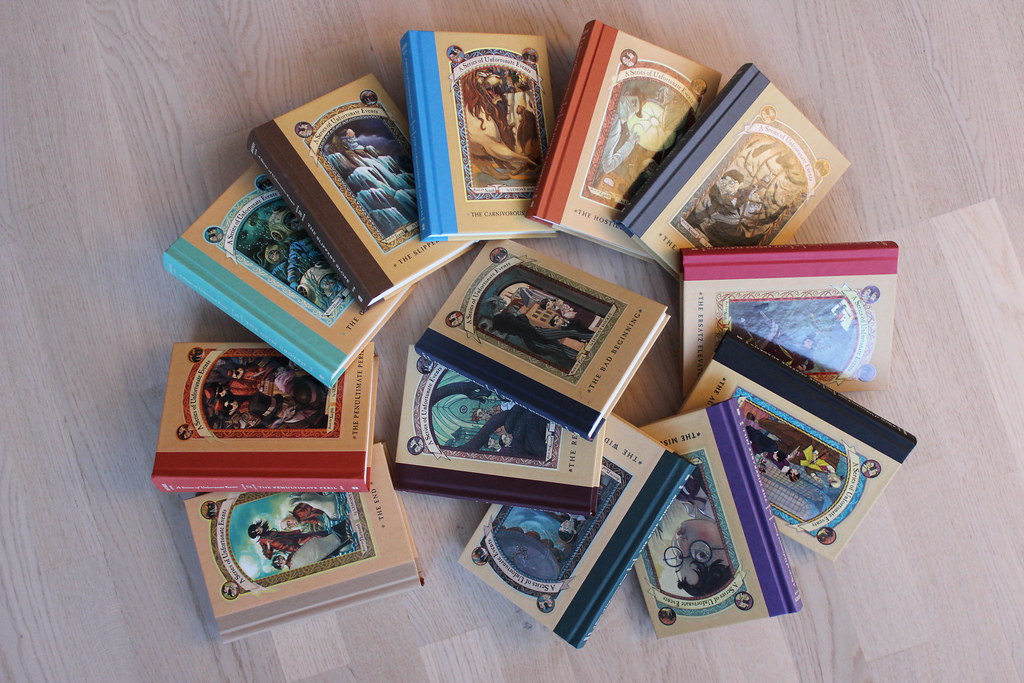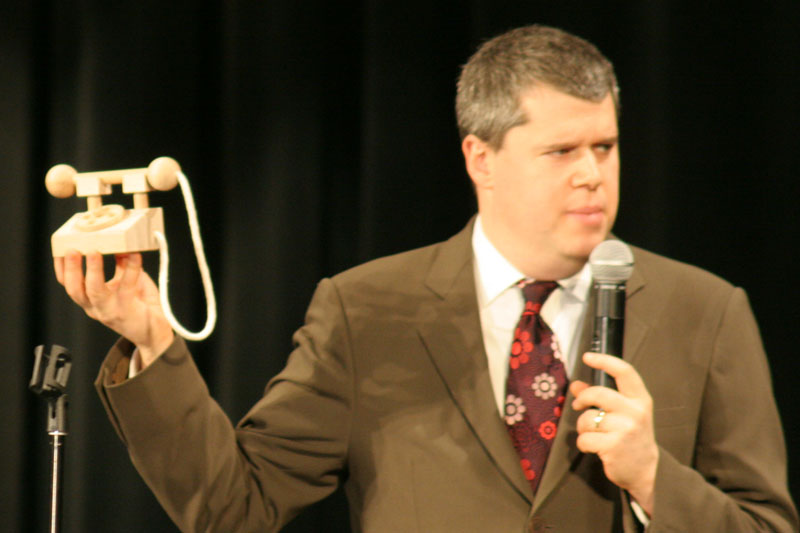Title of the work
Country of the First Edition
Country/countries of popularity
Original Language
First Edition Date
First Edition Details
Lemony Snicket, A Series of Unfortunate Events: The Bad Beginning, New York: HarperCollins, 1999, 163 pp.
Lemony Snicket, A Series of Unfortunate Events: The Reptile Room, New York: HarperCollins, 1999, 191 pp.
Lemony Snicket, A Series of Unfortunate Events: The Wide Window, New York: HarperCollins, 2000, 214 pp.
Lemony Snicket, A Series of Unfortunate Events: The Miserable Mill, New York: HarperCollins, 2000, 194 pp.
Lemony Snicket, A Series of Unfortunate Events: The Austere Academy, New York: HarperCollins, 2000, 221 pp.
Lemony Snicket, A Series of Unfortunate Events: The Vile Village, New York: HarperCollins, 2001, 256 pp.
Lemony Snicket, A Series of Unfortunate Events: The Ersatz Elevator, New York: HarperCollins, 2001, 256 pp.
Lemony Snicket, A Series of Unfortunate Events: The Hostile Hospital, New York: HarperCollins, 2001, 257 pp.
Lemony Snicket, A Series of Unfortunate Events: The Carnivorous Carnival, New York: HarperCollins, 2002, 286 pp.
Lemony Snicket, A Series of Unfortunate Events: The Slippery Slope, New York: HarperCollins, 2003, 337 pp.
Lemony Snicket, A Series of Unfortunate Events: The Grim Grotto, New York: HarperCollins, 2004, 323 pp.
Lemony Snicket, A Series of Unfortunate Events: The Penultimate Peril, New York: HarperCollins, 2005, 353 pp.
Lemony Snicket, A Series of Unfortunate Events: The End, New York: HarperCollins, 2006, 324 pp.
Awards
Multiple awards, including:
2001 – IRA Children's Choice Awards (The Wide Window);
2002 – IRA Children's Choice Awards (The Vile Village and The Hostile Hospital);
2003 – Colorado Children's Book Award - Junior Novel Winner (The Bad Beginning);
2003 – Nevada Young Readers Award - Young Reader (The Bad Beginning);
2005 – Nickelodeon Kids' Choice Awards - Favorite Book (A Series of Unfortunate Events);
2006 – Quill Book Award - Children's Chapter Books/Middle Grades (The Penultimate Peril).
Genre
Black humor
Comedy plays
Crime films
Fiction
Gothic fiction
Target Audience
Crossover
Cover

A Series of Unfortunate Events, the Complete Wreck, by Lemony Snicket, etdrysskanel.com. Uploaded by Synne Rustad. Retrieved from flickr.com, licensed under CC BY-NC 2.0 (accessed: January 26, 2022).
Author of the Entry:
Susan Deacy, University of Roehampton, s.deacy@roehampton.ac.uk
Peer-reviewer of the Entry:
Elżbieta Olechowska, University of Warsaw, elzbieta.olechowska@gmail.com
Daniel A. Nkemleke, University of Yaounde 1, nkemlekedan@yahoo.com

Brett Helquist
, b. 1966
(Illustrator)
Brett Helquist is an American illustrator who was born in Arizona and grew up in Utah. After Mormon missionary service in Hong Kong, he returned to Utah to attend Brigham Young University, initially as an Engineering student then switching to Fine Arts after working as an illustrator for a text book in Taiwan during a gap year. Since graduating, in 1993, Helquist has been based in New York City, initially as a graphic designer and after that as an illustrator for books for children and young adults, most famously each volume of A Series of Unfortunate Events.
Sources:
en.wikipedia (accessed: August 9, 2020);
Official website (accessed: August 9, 2020).
Bio prepared by Susan Deacy, University of Roehampton, s.deacy@roehampton.ac.uk

Lemony Snicket (Daniel Handler) by Mike Huang. Retrieved from Wikipedia, licensed under CC BY-SA 2.0 (accessed: January 26, 2022).
Lemony Snicket
[pen name of Daniel Handler] , b. 1970
(Author)
Daniel Handler is an American author best known for his series for children A Series of Unfortunate Events and its prequel All The Wrong Questions, written under the alias Lemony Snicket, which he adopted while writing his first novel, The Basic Eight. Handler has published a number of works for children under the name of Lemony Snicket as well as works for adults under his own name. He was born and grew up in San Francisco, where he now lives with his family. In 2018, he withdrew from delivering the commencement address at his alma mater, Wesleyan University, following protests from students at a number of inappropriate jokes made by Handler at public events.
Sources:
Official website (accessed: August 9, 2020);
wikipedia.org (accessed: August 12 2020);
psmag.com (accessed: August 12 2020).
Bio prepared by Susan Deacy, University of Roehampton, s.deacy@roehampton.ac.uk
Adaptations
TV: A Series of Unfortunate Events, Netflix/Paramount Television, 3 seasons, 2015–2019.
Film: Lemony Snicket’s A Series of Unfortunate Events, Nickelodeon Movies, 2004.
Video Games: Lemony Snicket’s A Series of Unfortunate Events, Adrenrum Games/Activision 2004; A Series of Unfortunate Events, Oberon Media, 2004.
Board Game: The Perilous Parlor Game, Mattel, 2004.
Card Game: Lemony Snicket’s A Series of Unfortunate Events: The Catastrophic Card Game, Mattel, 2004.
Translation
Multiple translations.
Sequels, Prequels and Spin-offs
All the Wrong Questions: four-part prequel series comprising
- Who Could that be at this Hour? (2012),
- When Did You See her Last? (2013),
- Shouldn’t You Be in School? (2014),
- Why is this Night Different from All Other Nights? (2015).
13 Suspicious Incidents (2014): companion short-story collection to All the Wrong Questions.
Summary
This series of thirteen 13-chaptered novels follows the "unfortunate events" which befall Violet, Klaus and baby Sunny Baudelaire after the death of their parents in a fire in the family home. On becoming orphans, the siblings are placed in the custody of their uncle, Count Olaf, who, from the first book onwards tries various – and typically murderous – ways, to acquire their huge fortune. Olaf is aided throughout by his accomplices in V.F.S., a mysterious organisation to which the children’s parents turn out to have had ties.
A pattern recurs in several of the books where, after having been placed in the care of a new guardian, Olaf appears, disguised and recognised only by the siblings, and attempts some new way to get hold of their fortune. Faced with each peril, the siblings each draw on a particular skill or attribute: Violet’s as an inventor, Klaus’ as a speed-reader, and Sunny’s exceptionally sharp front teeth. Each book is narrated by Lemony Snicket and dedicated, by Snicket, to a woman, now deceased, called Beatrice whose connection with the children is revealed in an epilogue: chapter fourteen of the thirteenth book. The books are full of allusions and references, including to classical myths, places and people.
Analysis
Since the publication of The Bad Beginning, readers have enjoyed the events and characters of the series often without noticing many – or any – of the numerous references and allusions. However, the series is rich in references including to the works of numerous authors including Lewis Carroll, Herman Melville, Franz Kafka, George Orwell, Albert Camus, Jules Verne, Edgar Allen Poe, and – from classical literature – Plato, Sappho and, above all, Homer. Each reference or allusion is relevant in some way to a specific book or to the series as a whole. For example, Beatrice, the name of the dead beloved of Lemony Snicket, likely references the name of Dante Alighieri’s unrequited love and also La Beatrice from Charles Baudelaire’s Les Fleurs du Mal. The family name – including, it transpires, of Beatrice – itself references the name of Baudelaire, La Beatrice’s creator.
Many references are likely to be missed by a number of children, and indeed adults, though others might be more recognisable, including the Monty Python reference in the name of the serpent-collecting Uncle Monty of The Reptile Room. The classical allusions and references, in common with the allusions and references drawn from postclassical history and literature, could be missed without detracting from the enjoyment of the novels, but – if spotted – they add some additional layer of meaning. This is the case, for instance, in the settings of several of the books, which allude to mythological or historical figures from classical antiquity. In the Wide Window, for example, the children find themselves in Damocles Dock. The name Damocles, as a by-word for possible disaster, suits the latest, perilous, situation the children face. Moreover, the specific danger faced by Damocles is evoked in the picture at the frontispiece of the book, which shows the children standing under an archway at Damocles Dock while a sword dangles above their heads. Later in the series, meanwhile, in The Grim Grotto, the children find themselves in a cave rich with Gorgon-associations conveyed by its name, the Gorgonian Grotto, and the name of the poisonous mushroom found there: the Medusoid Mycelium.
The names of some of the characters in the series likewise reference classical antiquity. The name of the Vice Principal of the Austere Academy is Nero, who, like his namesake, subjects those under his power to theatrical performances. Meanwhile, the Principal’s excruciating violin performances evoke the behaviour of his namesake who supposedly “fiddled while Rome burnt.” Among the castaways of the final novel, The End – each of whom shares a name with a literary island-dweller – is Calypso, referencing the nymph-goddess of the Odyssey.
The Odyssey is also evoked in the behaviour of the castaways, who strap sheep together like Odysseus and his men in the Cyclops’ cave and archieve a docility akin to the Lotus Eaters by drinking a coconut cordial.
Throughout the novels, the youngest sibling, Sunny, utters words which fall somewhere between baby-talk and gnomic wisdom. These utterings include ones with classical references. For example, when the children’s fellow pupil and friend, Isadora, says in The Austere Academy that she writes poetry, Sunny says the name of a female poet: "Sappho". When, in The Ersatz Elevator, Klaus mentions Scylla and Charybdis, Sunny says the name of a marine deity, “Glaucus”. In The Vile Village, where the children are considering what choice to make between two difficult options, she says "Scylla", the hazard picked by Odysseus instead of the whirlpool Charybdis.
In one of the few explicit classical references, the allegory of the cave by Plato – here "a philosopher" is included in a speech by Captain Widdershins about his ship’s sonar detector in The Grim Grotto:
"There was a philosopher who said that all of life is just shadows. He said that people were just sitting in a cave, watching shadows on the cave wall. Aye–shadows of something much bigger and grander than themselves. Well, that sonar detector is like our cave wall, showing us the shape of things much more powerful and terrifying." (p. 87)
Perhaps suiting a series where knowledge tends to be imperfect, when, in The Ersatz Elevator, Klaus relates the story of Scylla and Charybdis, he states that it involved Heracles rather than – as in the Odyssey – Odysseus. In another contrast to the Homeric encounter, Klaus says that the hero got away "by turning them both into whirlpools." On several levels, then, Klaus – or even Handler – gets the his source text "wrong." Furthermore, Charybdis alone was a whirlpool, and, far from escaping by turning Charybdis into a whirlpool, it is the very fact of being a whirlpool that makes Charybdis dangerous in the first place. But naming Heracles as the vanquisher of Scylla is not necessarily "wrong," since Scylla is among the various serpentine creatures defeated by Herakles at Tzetzes, On Lycophron’s Alexandra 45.
The potential allowance, via the Scylla-Heracles example, of different layers of mythological knowledge might be echoed elsewhere in the Ersatz Elevator. Here, Lemony Snicket dismisses myth as "entertaining…but never very helpful” after rejecting myth as conveying truth:
"One of the greatest myths in the world – and the phrase “greatest myths” is just a fancy way of saying “big fat lies” – is that troublesome things get less and less troublesome if you do them more and more […]. The truth is that troublesome things tend to remain troublesome no matter how many times you do them, and that you should avoid doing them unless they are absolutely urgent.” (pp. 161–162)
Snicket concludes, with possible ramifications for what to make of any of the mythical – and other – allusions across the series: "Myths are often entertaining, but they're never very helpful."
Further Reading
Kaczyńska, Barbara, “Metafiction in Children’s Literature and its Adaptation on Screen: The Case of Lemony Snicket’s A Series of Unfortunate Events”, New Horizons in English Studies 3.1 (2018): 71–85.
snicket.fandom.com (accessed: August 14, 2020).
www.inverse.com (accessed: August 14, 2020).


